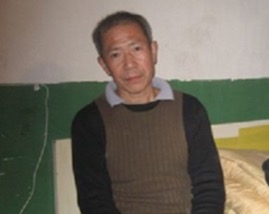China Sentences Veteran Human Rights Defender Qin Yongmin to 13 Years in Prison
July 11, 2018 Comments Off on China Sentences Veteran Human Rights Defender Qin Yongmin to 13 Years in Prison
(Network of Chinese Human Rights Defenders – July 11, 2018) – Veteran human rights defender Qin Yongmin (秦永敏) has received another lengthy prison sentence for “subversion of state power” over his writings and advocacy activities in promoting democracy and defending human rights. The Wuhan City Intermediate People’s Court found Qin guilty of “subversion of state power” on July 11 and handed down a 13-year prison term, following an unfair trial on May 11-12.
The verdict against Qin Yongmin is grossly unjust, and his imprisonment is blatantly arbitrary. The Chinese government is punishing Qin for exercising his human rights. Authorities denied him basic due process rights, including the right to legal counsel without political interference. The Chinese government has once again desecrated international human rights standards, which China has obligations to uphold as a member of the UN Human Rights Council.
In court documents, prosecutors cited as “evidence” Qin’s writings about a peaceful transition to democracy and his role in the group Human Rights Watch in China (HRWIC, or the “Rose Team”), including an article where he called for the government to protect human rights in China under the Universal Declaration of Human Rights and the International Covenant on Civil and Political Rights. Qin’s colleague Xu Qin (徐秦), another leader of HRWIC, was detained in February 2018 and then placed under “residential surveillance in a designated location” in March on a charge of “inciting subversion.” In punishing Qin Yongmin so severely, the Xi Jinping government is sending more signals that it is determined to crush human rights advocacy NGOs and civil society in the country.
Wuhan authorities denied Qin even a semblance of a fair trial. During the first day of court proceedings in May, Qin fainted and apparently fell gravely ill. After a brief adjournment, bailiffs dragged the barely conscious Qin to the stand, propping him up while he remained in a state of unconsciousness. As prosecutors read out the indictment against him, the presiding judge asked Qin questions, but he was not responsive. When proceedings resumed the next day, Qin appeared ill and drugged, and he remained unable to respond to questions. His lawyers, Liu Zhengqing (刘正清) and Lin Qilei (蔺其磊), whose repeated requests for Qin to receive urgent medical treatment had been rejected as they themselves faced threats to be barred from the trial, refused to present their oral arguments as a form of silent protest. When the show trial was over, the lawyers did not sign the court transcript and told the court that the trial was unfair without Qin’s actual participation.
For the sentencing hearing on July 11, Qin’s family was not allowed to attend, and police detained several of his supporters.
CHRD has appealed to several of the UN Human Rights Council’s Special Procedures, alleging that the Chinese government has violated a litany of Qin Yongmin’s human rights in detaining and prosecuting him, and urging the independent experts to take urgent actions to demand China release Qin immediately, provide redress for damages to Qin, and seek accountability for the abuses of his human rights.
Qin was seized by police on January 9, 2015, immediately after completing a 10-day administrative detention for allegedly “organizing an illegal assembly.” He was soon after taken to Baxian Island along with his wife, Zhao Suli (赵素利), who was taken into custody at the same time as Qin. The couple was held on the island for about 70 days and guarded around-the-clock by Wuhan public security officers. Wuhan police formally arrested Qin in May 2015, on a charge of “inciting subversion of state power.” The Wuhan City People’s Procuratorate repeatedly sent Qin’s case back to police for “further investigation” before indicting him on the more serious charge of “subversion” in June 2016. Meanwhile, Zhao Suli was held in black jails (extralegal detention facilities) for two years. She was released in 2017 but put under residential surveillance at home, and she remains under constant restrictions by police.
Qin Yongmin has devoted his life’s work to pro-democracy advocacy since the late 1970s, when he began to edit and publish a journal, “The Bell.” In 1980, he helped establish the China Democracy Party (CDP), which the government subsequently banned. Qin had served two previous prison sentences, one for eight years from 1982 for “counter-revolutionary propaganda and incitement” and another for 12 years from 1997 for “subversion of state power.”
Read CHRD’s Urgent Appeal on Behalf of Qin Yongmin Submitted to UN Special Procedures:
Contacts
Renee Xia, International Director (Mandarin, English), +1 863 866 1012, reneexia[at]nchrd.org, Follow on Twitter: @ReneeXiaCHRD
Victor Clemens, Researcher (English), +1 209 643 0539, victorclemens[at]nchrd.org, Follow on Twitter: @VictorClemens
Frances Eve, Researcher (English), +852 6695 4083 franceseve[at]nchrd.org, Follow on Twitter: @FrancesEveCHRD
